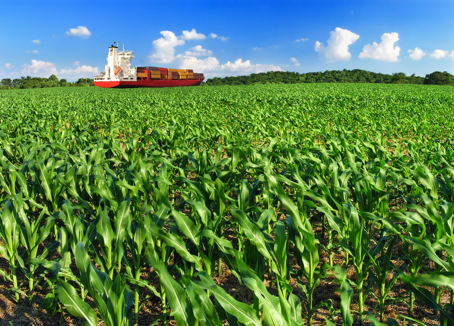Waves of grain
Add Summary

July 13, 2017
Anna Herzberger is an MSU Center for Systems Integration and Sustainability doctoral student studying soybean production the Heilongjiang Province in northeastern China and in the United States. She hails from the farmlands of Virginia, Ill.
My car packed with too many clothes, an extremely terrified cat and a live Kombucha culture, I headed west to my summer field site.
Oddly enough, my summer field site is also where I grew up.
The endless waves of grain remind me of my labor-intensive childhood detasseling corn,1 walking beans2 and bucking bales.3 I am not sure if there is an agricultural version of urban dictionary, but please see below for humorous definitions inspired by my childhood.
As a counter to my research last summer in China, this summer my fieldwork explores how connected U.S. producers are globally via agricultural trade. The first interview we conducted was with my dad and the following ones were with people to whom Dad connected us. This gave me a chance to mess up in a friendly environment -- I was unsure how the farmers would react to specific questions and practicing with friendly farmers first allowed us to make necessary changes. However, this means the first 10 farmers I interviewed remember me as the curly-headed little girl pulling on my father’s pant leg while he was trying to discuss the weather or something equally boring to a child.
This was a unique dynamic.
 The first thing I cover at the beginning of an interview is the consent form and the Institutional Review Board-recommended channels to file a complaint. Typically, the farmers would glance at the consent form, push it back to me and say, “I’ll just call your dad.”
The first thing I cover at the beginning of an interview is the consent form and the Institutional Review Board-recommended channels to file a complaint. Typically, the farmers would glance at the consent form, push it back to me and say, “I’ll just call your dad.”
In addition to filing complaints with my father rather than my boss, several of the farmers assumed my intern, Jake, was actually my little brother. In the farmers’ defense, Jake is only two years younger than my little brother and they do look similar. The case of Jake’s mistaken identity could have been fixed if I could remember to introduce Jake as my agricultural policy intern who is studying anthropology at William and Mary University -- but I can’t remember. I can’t even remember to bring a pen to the interviews. So much, in fact, that if you asked Jake what his number one responsibility is, he would say, “To give Anna pens.”
I don’t even need a pen.
Jake’s job is to transcribe the interview. I ask questions and form a dialogue with the farmer while Jake notes the answers to questions we have during the on-going conversation. I only hold a pen because I feel nervous and during the awkward moments of silence it helps to be able to pretend I am taking notes while I actually try to think of follow-up questions to ask the farmer. After the interview, Jake types and cleans his notes before sending them to me and I add additional information if any was left out. After we feel confident with our transcription of the interview, we email it back to the farmer so he/she can review it and make any changes or corrections to his/her answers. This really strengthens the trust between the farmers and us. It would never be our intention to misrepresent or misunderstand something the farmer said, but it could definitely happen. By sending the transcription back to them, they have final say and ownership over their interview and our science is better because of that.
And that’s the goal, right? I have to explicitly tell the farmers I am here to learn from them, not teach them. But most of their exposure to research is Extension-based, where university or government researchers try to get the farmers to change their practices for sustainabili



 Print
Print Email
Email





